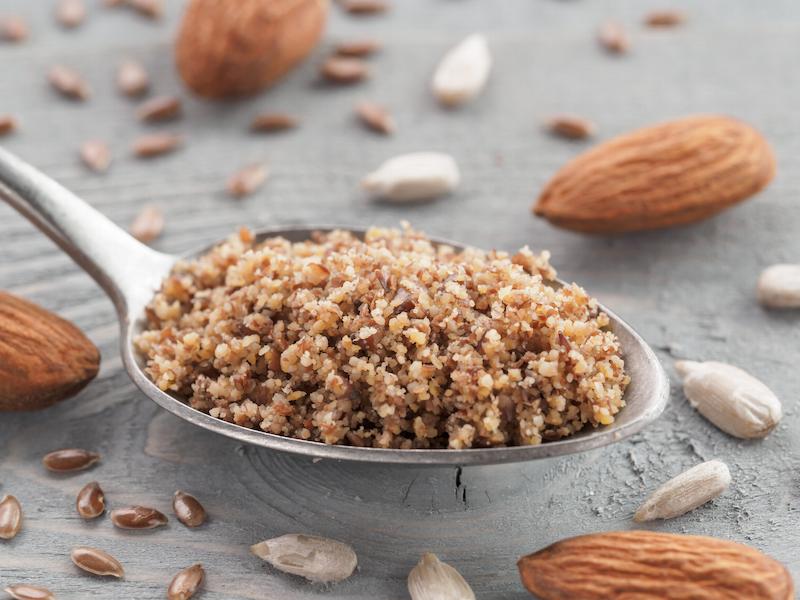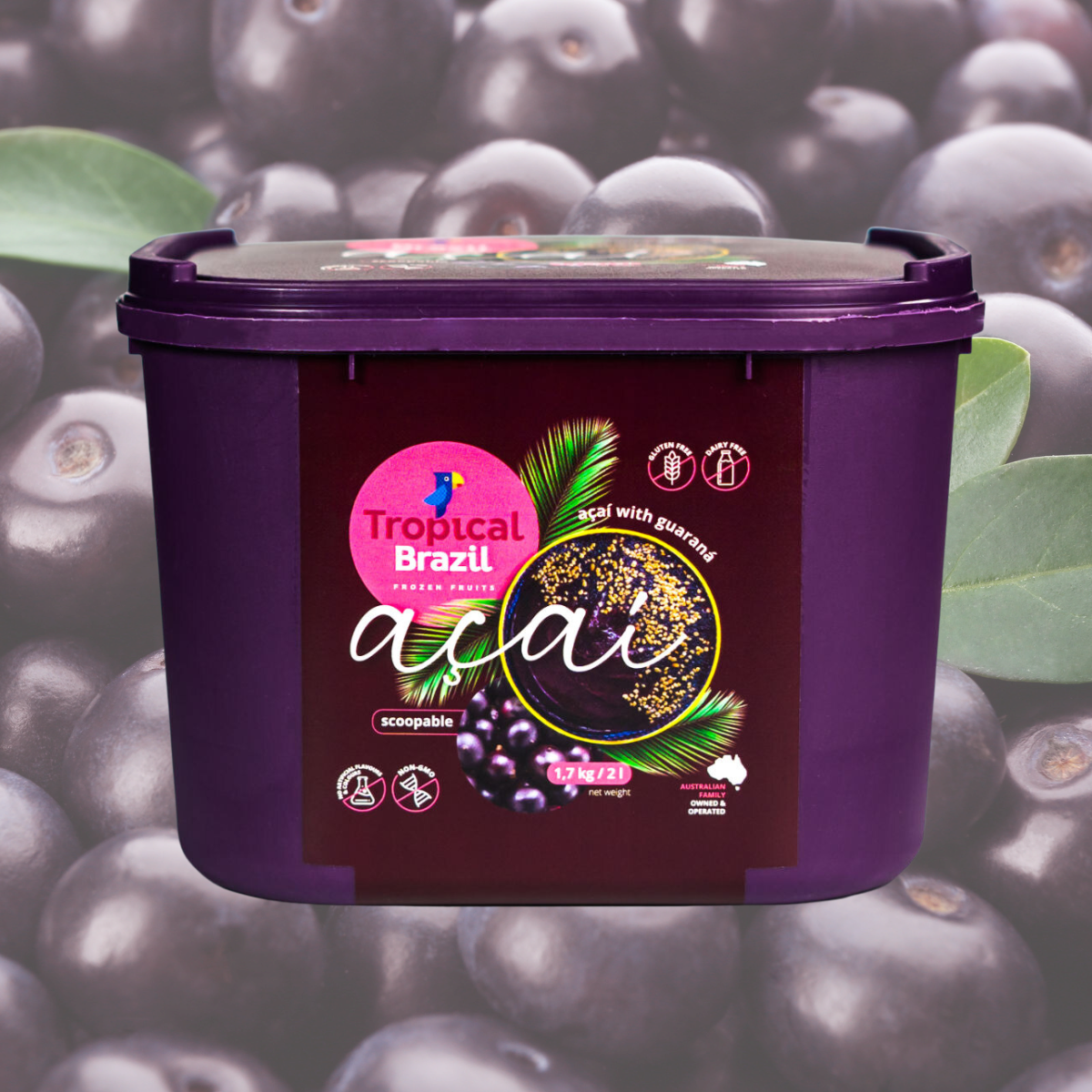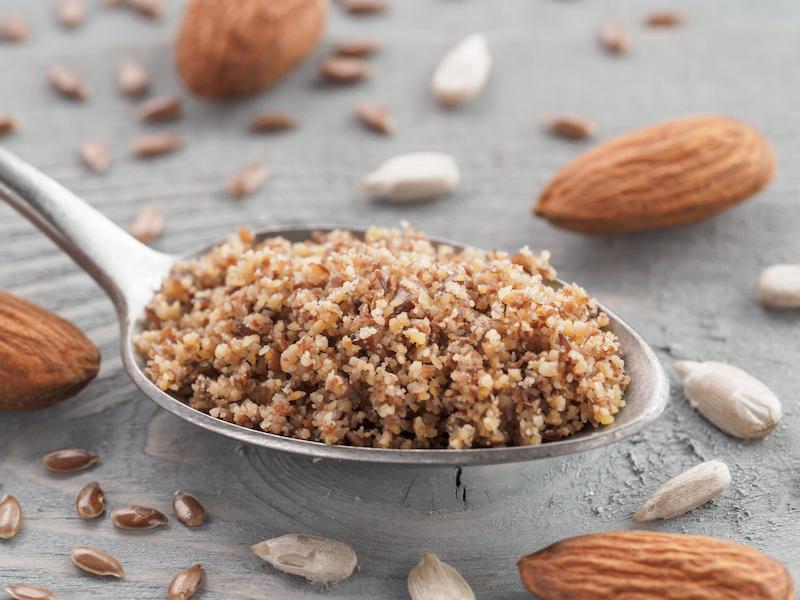WHAT IS LSA?
LSA is a combination of ground linseed (flaxseed), sunflower seeds and almond meal. It’s incredibly easy to make, however just as nice to find it ready-made. LSA can vary in texture and colour depending on the mill, quality of ingredients and ratios of each.
The major nutritional benefits of LSA include the extra dietary fibre, minerals and essential fatty acids. Broadly speaking, these nutrients help with things like liver detoxification, hormone modulation, cardiovascular health and immune and skin health. Let’s break down each part and appreciate why LSA has become a mainstay in our kitchen cupboards.

LSA NUTRITIONAL INFORMATION & HEALTH BENEFITS
- High in omega 3 and 6
- Contains soluble and insoluble fibre
- High in vitamin E
- Rich in polyphenols
- Supports liver and bowel detoxification
- High in protein, zinc, manganese
- Improves cholesterol levels

LINSEEDS
Of all the seeds that gained nutritional momentum during my degree, linseeds would undoubtedly be the front-runner seed. They are one of the three main ingredients in LSA. Also known as flaxseeds, the botanical name Linum usitatissimum actually means ‘very useful’ and with that I’d have to agree.
They are most famous in the scientific literature for their high lignan content, found in the outer skin. Sesame seeds are also high in lignans.
 In the world of nutritional medicine, the main reason we love linseeds in particular is because of their ability to mimic oestrogen in the body. Linseeds can be incredibly useful for women with oestrogen metabolism issues or for postmenopausal women as a way to influence endogenous hormone function in the body.
In the world of nutritional medicine, the main reason we love linseeds in particular is because of their ability to mimic oestrogen in the body. Linseeds can be incredibly useful for women with oestrogen metabolism issues or for postmenopausal women as a way to influence endogenous hormone function in the body.
One study examined the benefits of consuming 50g of linseeds for a 4-week trial period in a group of healthy young adults. At the end of the study, there were significant increases in omega 3 levels and lower LDL cholesterol levels in the blood results of the participants. This same study revealed that the overall antioxidant status was unchanged after the linseeds were used in baking.
This is surprising because high temperatures typically break down antioxidants, and therefore another flex for linseeds as an awesome health food!
The specific antioxidant in linseeds is called secoisolariciresinol diglucoside (SDG) - thank god for the abbreviation! This polyphenol actually helps protect the sensitive linolenic acid within the seed from oxidation, thereby preserving its anti-inflammatory effects. Research also suggests that the bioavailability of lignans within linseeds can be improved by milling.
A 2019 double blind RCT found that linseeds also appear to have cardiovascular benefits, with anti-atherogenic and anti-hypertensive properties. This translates to being protective against cholesterol plaque formation in arteries and also helping to lower blood pressure.

SUNFLOWER SEEDS
Also a new player in the super-seed arena, sunflower seeds are worth their weight in nutritional gold. One study examining the constituents of 27 different nuts and seeds found that sunflower seeds had among the highest levels of plant sterols, making them naturally heart-healthy.
They are mild, tender and like many seeds are super versatile in baking or enjoying raw. High in vitamin E and selenium, sunflower seeds can help protect against systemic inflammation in the body. The flavonoid content in sunflower seeds accounts for their specific antioxidant qualities, which also helps protect against heart disease and some cancers.
To be even more impressive, sunflower seeds contain decent levels of vitamin C, calcium, zinc and B vitamins, which assist in various physiological functions such as tissue healing, immune health and healthy hormones.

ALMONDS
Best known for their dietary fibre, high protein content, good fats, minerals and vitamin E, almonds could arguably be the most impressive component of LSA, considering just how healthy they are.
Almonds are sweet, crunchy and a nutrient bomb with loads of versatility in sweet and savoury foods. Similar to linseeds, the bioavailability of some nutrients within almonds, such as polyunsaturated fats is increased when ground or milled. LSA is ground and ready-to-go so it’s never been easier to get a nutrient boost in your diet.
 Almonds are one of the most well-researched nuts and the evidence is robust that they benefit a broad range of bodily systems.
Almonds are one of the most well-researched nuts and the evidence is robust that they benefit a broad range of bodily systems.
One meta-analysis reported that the vitamins, minerals and polyphenols in almonds had profound synergistic and protective effects against the development of Alzheimer’s disease and brain health. The authors demonstrated that almonds appear to reduce stress-signalling and inflammation in the brain and nervous system (Gorji et al. 2018).
Kalita et al. (2018) also found that almonds are strongly recognised for their ability to protect against cardiovascular disease and diabetes development. The results from a 2012 clinical trial stated that almond supplementation delivered favourable outcomes in type 2 diabetes patients, with significantly reduced fasting glucose and insulin levels at the end of 24 weeks.
The natural oils in almonds support the lipid barrier function of the skin, giving a youthful appearance and contributing to almond’s anti-aging health claims. Foolad et al. (2019) conducted a small pilot study and found that daily almond consumption showed visible improvements in skin appearance by reducing wrinkle severity.
STORING LSA (AND ALL NUT AND SEED FLOURS)
It’s really important to carefully store food products with a high unsaturated oil content. Once nuts and seeds have been processed, they’re susceptible to oxidation and rancidity from the elements.
Buying LSA in small batch packs is ideal to prevent a large volume spoiling and being unfit for consumption. Not only is the taste compromised, so are the health benefits. Because of their exposure to heat, light or oxygen, any of the oils that were previously healthful, could now be inflammatory if consumed in high amounts.
 Tip: You can tell if your nuts or seeds are ‘off’. They smell and taste bitter. You know they’re either past their expiration date or haven’t been processed or stored properly. Quality suppliers know this and take great care of their products to ensure the nutritional content is as high as can be. My recommendation is to keep milled nut or seed flours in the fridge, or in an airtight container away from direct sunlight.
Tip: You can tell if your nuts or seeds are ‘off’. They smell and taste bitter. You know they’re either past their expiration date or haven’t been processed or stored properly. Quality suppliers know this and take great care of their products to ensure the nutritional content is as high as can be. My recommendation is to keep milled nut or seed flours in the fridge, or in an airtight container away from direct sunlight.
HOW TO USE LSA!
I prefer to incorporate LSA (linseed, sunflower seed, and almond meal) into cold or room temperature recipes when using acai scoopable cream because it helps retain the healthy fats present in LSA.
RECIPE
LSA-licious Acai Avalanche
Ingredients:
- 2 frozen acai berry packs
- 1 ripe banana
- 1/2 cup of almond milk (or any plant-based milk of your choice)
- 1 tablespoon of LSA (linseed, sunflower seed, and almond meal)
- 1 tablespoon of honey or maple syrup (optional, for added sweetness)
- Toppings of your choice (such as fresh berries, sliced bananas, granola, coconut flakes, or chopped nuts)
Instructions:
- In a blender or food processor, combine the frozen acai berry packs, ripe banana, almond milk, LSA, and honey or maple syrup (if using).
- Blend the ingredients until you achieve a smooth and creamy consistency. You may need to stop and scrape down the sides of the blender or food processor to ensure everything is well mixed.
- Once the mixture is smooth, transfer it to a bowl.
- Add your desired toppings, such as fresh berries, sliced bananas, granola, coconut flakes, or chopped nuts.
- Serve immediately and enjoy your delicious Acai Scoopable Cream with LSA!
Note: You can adjust the consistency of the cream by adding more or less almond milk, depending on your preference. Also, feel free to experiment with different toppings to customize your bowl according to your taste.


